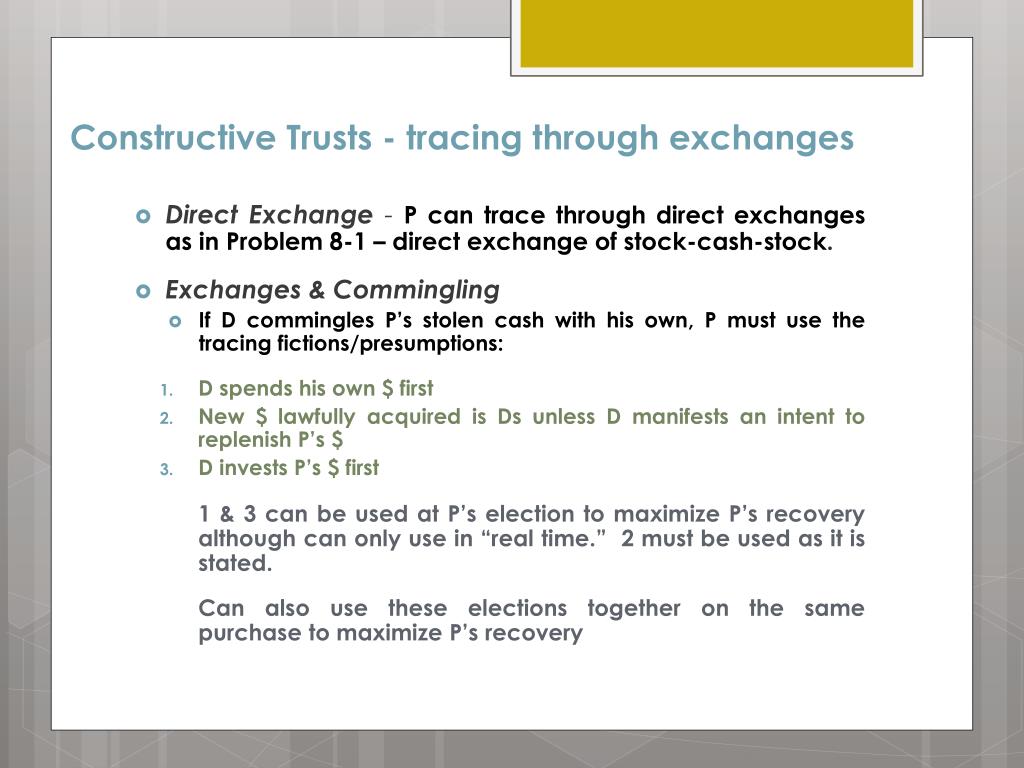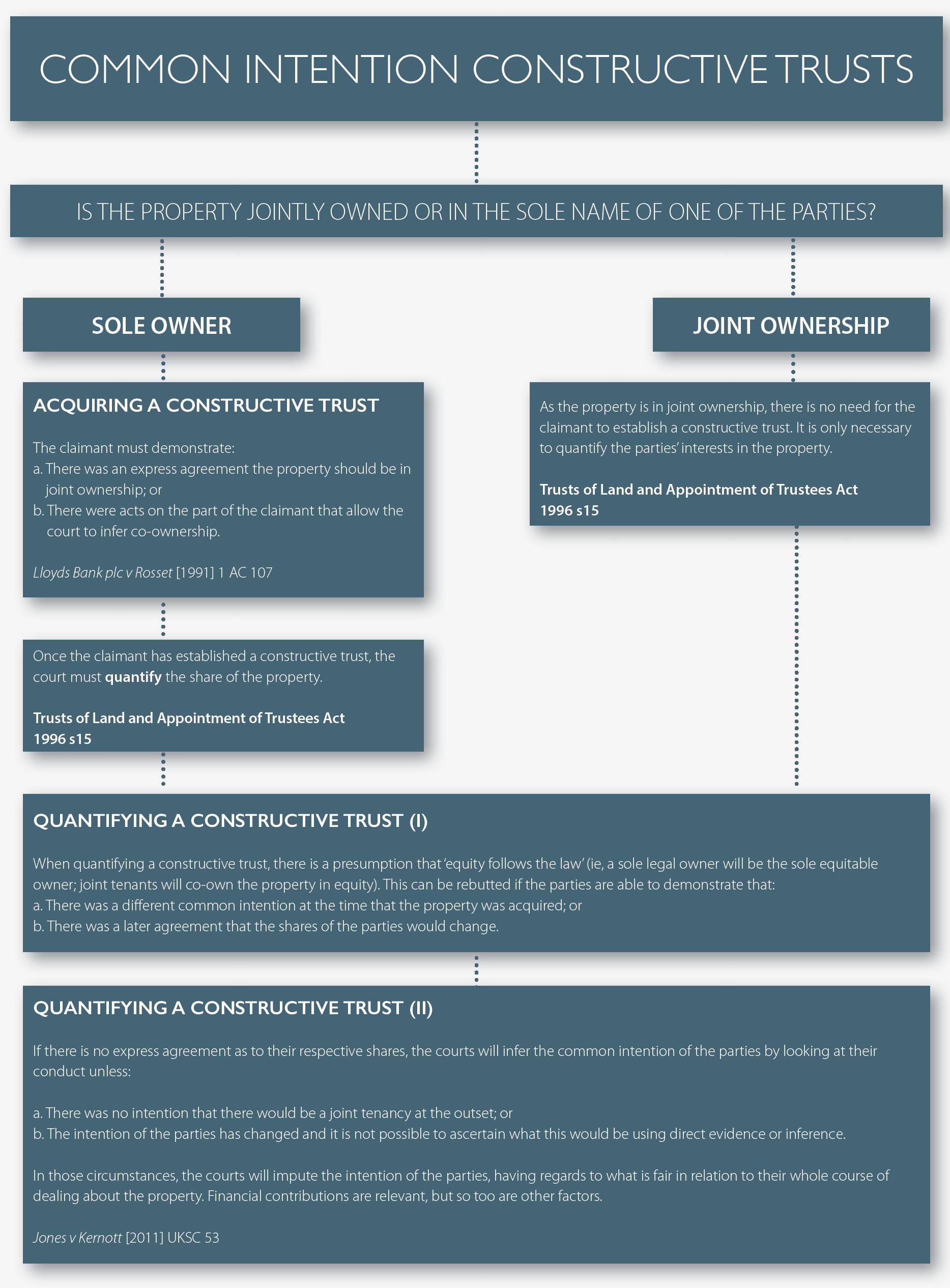Checking out Exactly How Does a Useful Count On Operate In Residential Or Commercial Property and Asset Disputes
The concept of a constructive trust fund functions as a crucial system within home and asset disputes, resolving circumstances where one event has unfairly profited at the expenditure of one more. This equitable solution not only looks for to remedy injustices but additionally highlights the importance of purpose and contribution in determining rightful possession. By analyzing the subtleties of exactly how constructive trust funds operate, one can reveal the complexities that often emerge in legal contexts. What effects do these counts on hold for future disputes, and exactly how might they affect the landscape of building law?

Meaning of Constructive Trust
A positive trust develops when a court determines that it is required to stop unjust enrichment, often in scenarios where a celebration has actually gotten building through wrongful means or under scenarios that necessitate equitable relief. This legal treatment is not officially developed by the parties included; rather, it is enforced by the court to resolve situations where justness and justice need intervention.
Constructive trust funds are frequently invoked in cases including scams, breach of fiduciary responsibility, or other kinds of transgression. For instance, if an individual wrongfully takes possession of home that rightfully belongs to another, the court may impose a constructive trust fund to make certain that the culprit holds the residential property for the advantage of the rightful owner. This lawful concept runs on the concept that it would be inequitable for the perpetrator to retain the benefits originated from their misbehavior.
Ultimately, a useful count on works as an effective tool in property disagreements, strengthening the idea that ownership need to show not just legal title but also honest factors to consider. By acknowledging the demand for equitable alleviation, courts make sure that justice dominates in the distribution of residential or commercial property and properties.
Secret Concepts of Useful Counts On
While the application of constructive counts on might differ depending upon specific circumstances, a number of key concepts continually underpin their enforcement in building disputes. The concept of unjust enrichment plays a critical role; a positive depend on is usually imposed to stop one event from unfairly benefiting at the cost of an additional. This principle underscores the equitable nature of constructive depends on, stressing that lawful ownership does not constantly equate to rightful possession.
Second of all, the requirement of a fiduciary relationship is significant. What Is A Constructive Trust. Positive depends on regularly arise in contexts where one party has an obligation to act in the very best passions of an additional, such as in collaborations or joint endeavors. Violations of this obligation can trigger the charge of a positive depend on to shield the hurt event's passions
In addition, the teaching of purpose is crucial, as courts take into consideration whether the events planned to develop a trust-like connection, even if not formally documented. Finally, the principle of fair solutions highlights that positive trust funds serve to provide alleviation that straightens with justness and justice, making sure that the rightful plaintiff can restore building or possessions that they are entitled to, despite lawful title staying somewhere else.
Applications in Residential Or Commercial Property Disagreements
Useful trusts discover significant application in building conflicts, specifically when attending to issues of ownership and fair rights. These trusts develop in situations where one event holds home under problems that, in fairness and justice, must benefit one more event. The equitable remedy of a constructive count on prevents unjust enrichment by acknowledging the payments of a party that, despite lacking official title, has a reputable case to the residential or commercial property.
One usual situation includes cohabiting companions who contribute to the acquisition or maintenance of building but are not on the title act. In such instances, the courts may enforce a constructive count on to show the events' objectives and contributions, therefore ensuring that the non-titled partner gets a fair share of the building.
In addition, constructive trusts can be important in conflicts including inheritance or family members building, where a decedent's intent may not have been formally recorded. Courts might presume a positive depend recognize the decedent's dreams and fix possible injustices among heirs. In general, positive counts on work as a crucial tool in balancing rights and guaranteeing straight from the source equitable outcomes in residential or commercial YOURURL.com property conflicts, reinforcing the principle that justness need to dominate in ownership issues.
Situation Research Studies and Examples
Residential or commercial property disputes entailing useful depends on can commonly be highlighted through real-life instance research studies that highlight the intricacies and nuances of equitable rights. One remarkable instance is * Gissing v. Gissing *, where an other half declared an advantageous passion in the household home, arguing that her economic contributions throughout the marriage warranted a useful count on. The court ultimately regulationed in her favor, establishing that her contributions developed an equitable passion regardless of the property being exclusively in her spouse's name.
An additional illustrative case is * Thompson v. Thompson *, where brother or sisters contested the possession of a household estate after their parents' passing. One brother or sister had preserved and boosted the residential property, asserting that these actions justified a positive count on. The court identified the sibling's efforts and located that a useful trust fund was necessary to stop unjust enrichment, therefore granting them a share in the estate.
These cases exemplify exactly how constructive trusts offer to resolve situations where lawful possession does not reflect real fair passions of the parties involved, highlighting the relevance of intent and contributions in determining rightful insurance claims in home conflicts.
Lawful Effects and Factors To Consider
When addressing constructive trust funds in property disagreements,Countless lawful ramifications and considerations arise. Foremost, the facility of a constructive count on generally depends upon the existence of an unjustified enrichment, where one celebration benefits at the expenditure of an additional. This concept demands a comprehensive assessment of the connection between the events and the conditions that led to the alleged injustice.
Furthermore, courts frequently require clear proof of the claimant's payment to the residential property or possession concerned, which can consist of financial investments, labor, or various other types of assistance. other The problem of proof relaxes with the plaintiff, demanding careful documentation and statement to validate their claims.
Additionally, the timing of insurance claims is vital, as laws of restrictions might limit the ability to develop a positive trust after a certain duration. Legal advise should browse these time constraints very carefully to make sure that cases are filed in a prompt fashion.
Lastly, the possibility for conflicts over the intent behind residential or commercial property transfers can make complex issues even more, requiring a nuanced understanding of both legal law and situation regulation to efficiently promote for a customer's rate of interests in useful trust fund claims.
Final Thought

The principle of a constructive depend on offers as a vital system within residential property and property disputes, attending to scenarios where one party has unjustly profited at the expenditure of another. If a private wrongfully takes ownership of building that rightfully belongs to one more, the court might impose a positive count on to make sure that the criminal holds the building for the advantage of the rightful proprietor.Useful depends on discover considerable application in home conflicts, particularly when dealing with issues of ownership and fair civil liberties. Generally, useful counts on offer as an essential device in balancing rights and ensuring equitable end results in residential or commercial property conflicts, reinforcing the principle that justness should dominate in ownership matters.
In recap, useful counts on serve as vital equitable solutions in property and property disagreements, dealing with unjustified enrichment by recognizing the contributions of parties involved. - What Is A Constructive Trust